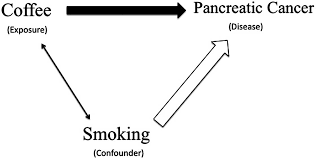
Basic Research is performed to learn about something. It is curiosity-driven and used to expand upon knowledge. It doesn't have an immediate objective. An example of basic research would be a study assessing the impacts of caffeine ☕️ consumption on the brain. As you can see from the example, the goal is not to solve a problem it is only to increase knowledge about a particular topic.
Applied Research answers specific questions and is used to solve a problem or do something of practical use. An example of applied research would be trying to find a cure for obsessive-compulsive disorder.
Even though you have probably learned this a million times, here is a quick overview:
There are several types of variables in an experiment. There is the independent variable , dependent variable , confounding variables , and control variables .

Well, then you can prove why something happened without an alternate explanation. You can’t say the type of bed or the difficulty of the test impacted those results if the researcher kept those the same throughout the experiment.
** Remember: Experiments are the only research that can determine cause and effect . **
Also, a researcher must use random assignment to demonstrate cause and effect. Random assignment is when participants are assigned to each experimental group with an equal chance ⚖️ of being chosen. Don't confuse this with a random sample : each individual in the population has an equal chance of participating in an experiment.
Random assignment is randomly selecting people to be in an experimental group while random sample is randomly selecting people from the population to be in the experiment as a whole. Both random sampling and random assignment ultimately lead to the most accurate results.
Sampling bias is a result of a flawed sampling process that produces an unrepresentative sample.
Experimenter bias is when researchers influence the results of an experiment to portray a certain outcome. A double-blind procedure is when neither the researcher or the participants know what groups the participants have been assigned to. This helps prevent bias when the researcher is looking over the results.
Researchers and scientists cannot rely on common sense because of three main concepts:
Applied Research : Applied research refers to scientific study and research that seeks to solve practical problems. This kind of research plays an important role in solving everyday issues that often have an impact on life, work, health, and overall well-being.
Basic Research : Basic research is a type of scientific study aimed at expanding knowledge and understanding fundamental concepts. It's not necessarily intended for immediate, practical application.
Cause and Effect : Cause and effect is a relationship between events or things, where one is the result of the other. This is a combination of action and reaction.
Confounding Variables : These are factors other than the independent variable that may cause a result in an experiment, making it difficult to determine if the results were due to the independent variable or these other factors.
Control Variables : Control variables are factors that researchers keep constant to ensure that they do not interfere with the results of an experiment.
Dependent Variable : The dependent variable is what changes when the independent variable changes - it's what you're interested in measuring as a result of your experiment.
Double-Blind Procedure : A double-blind procedure is an experimental method used to eliminate bias. In this setup, neither the participant nor the experimenter knows which group (control or experimental) the participant is in.
Experimenter Bias : Experimenter bias refers to the possibility that a researcher's expectations might skew the results of an experiment.
Hawthorne Effect : The Hawthorne Effect refers to the alteration of behavior by the subjects of a study due to their awareness of being observed.
Hindsight Bias : Hindsight bias is the tendency to believe, after learning an outcome, that one would have foreseen or predicted it.
Hypothesis : A hypothesis is an educated guess or proposition made as a basis for reasoning or research without any assumption of its truth. It's testable and falsifiable statement about two or more variables related in some way.
Independent Variable : The independent variable is the factor in an experiment that a researcher manipulates to see if it has any effect on the outcome.
Operational Definitions : An operational definition describes how to measure a variable or define a term. It outlines the procedures used in research.
Overconfidence : Overconfidence refers to the tendency of an individual to overestimate their abilities and knowledge, leading them to make decisions without considering potential risks or negative outcomes.
Random Assignment : Random assignment is a method used in experiments to ensure that each participant has an equal chance of being placed into any group. This helps to eliminate bias and make sure the results are due to the variable being tested, not differences between groups.
Random Sample : A random sample is a subset of individuals randomly selected by researchers from a larger population. Each individual has an equal probability of selection which helps ensure that the sample represents the population well.
Sampling Bias : Sampling bias occurs when some members of your intended population have lower sampling probability than others or when there's systematic difference between samples taken at different times or places. It can lead to misleading results.
Scientific Method : The scientific method is a systematic procedure that researchers use to conduct experiments. It involves observing, forming questions, making predictions, doing experiments, and developing theories.
Theory : A theory is a well-substantiated explanation of some aspect of the natural world that is acquired through the scientific method and repeatedly tested and confirmed, preferably using a written, pre-defined, protocol of observations and experiments.